Abstract
Background
The evaluation of cardiac performance is very important to management and prognostication in hypertensive patients. Although ejection phase indexes have been used for assessing left ventricular systolic function they are highly dependent on cardiac loading conditions. In addition, these load-dependent indexes may not differentiate accurately between the effects of altered loading conditions and intrinsic abnormalities in contractile function of cardiac muscle. In recent years, the end-systolic pressure to volume or dimension relations have emerged as a reliable measure of the myocardial contractility. The authors studied the changes of end-systolic pressure to volume or dimension relations according to pre-load and after-load by using the Echocardiogrom.
Methods
By 2-D and M-mode Echocardiogram we measured the ratio of end-systolic wall sress to end-systolic volume index(EWS/ESVI), peak systolic pressure to end-systolic dimension of left ventricle(PSP/ESD), peak systolic pressure to end-systolic volume index(PSP/ESVI) to assess myocardial contractility in 139 normal subjects and 55 patients with untreated essential hypertension. Then we compare these indexes to systemic blood pressure & left ventriclular end-diastolic dimension.
Results
1) EF, %FS, and mVcf were similar in both groups, but PSP/ESD, PSP/ESVI, EWS/ESVI tor the hypertensive group were greater than that for the normal group.
2) There was poor relation between arterial blood pressure and EWS/ESVI than other load-independent indexes in both groups.
3) There was poor relation between left ventricle end diastolic dimension than other load-independent indexes in both groups.
References
1). Aurigemma GP, Gausch WH, Villegas B, Meyer TE. Noninvasive assessment of left ventricular mass chamber volume and contractile function. Current Problem in Cardiology. 20:361. 1995.

2). Braunwald E, Ross J, Sonnenblick EH. Mechanisms of contraction of the normal and failing heart. 2nd ed. Little Brown Boston;p. 130–165. 1976.
3). Nivatpumin T, Katz S, Schever J. Peak left ventricular systolic pressure/end-systolic volume ratio; A sensitive detector of left ventricular disease. Am J Cardiol. 43:969. 1979.
4). Suga H, Sagawa K. Instantneous pressure-volume relationships and their ratio in the excised, supported canine left ventricle. Circ Res. 35:117. 1974.
5). Suga H, Sagawa K, Shoukas AA. Load independence of the instantaneouse pressure volume ratio of the canine left ventricle and effects of epinephrine and heart rate. Cir Res. 32:314. 1973.
6). Itaya M, Takahashi H, Faruta Y, Ogata Y, Fujiyama M, Jinnouchi J, Koga Y, Utsu F, Toshima H. Clinical study of ventricular end-systolic dimension and systolic blood pressure/end diastolic dimension ratio as the indices of left ventricular function. J Cardiography. 11:529. 1981.
7). Higuma N, Tsutsui M, Toeda T, Yamazoe M, Matsuda H, Kasahara T, Arai Y, Izami T, Shu T, Tamura K, Murooka H, Shihata A. Significance of peak left ventricular systolic pressure/end-systolic volume rates for the assessment of left ventricular contractility: Comparison of left ventriculography and echocardiography. J Cardiography. 10:441. 1980.
8). Sasaki T, Matsuzaki M, Takuhashi Y, Toma T, Ogawa H, Natito H, Matsuda Y, Kumada T, Kusukawa R. Significance of noninvasive parameter(PSP/ESVI) in assessing left ventricular contractility. J Cardiography. 11:543. 1981.
9). Garavaglia GE, Messerli FH, Nunez BD, Schieder RE, Grossman E. Myocardial contractility and left ventricular function on obese patients with essential hypertension. 62:594. 1988.
10). Friedman MJ, Roeske WR, Sahn DJ, Iarson D, Goldberg S. Acurracy of M mode echocardiographic measurements of the left ventricle. Am J Cardiol. 49:716. 1982.
11). Devereux RB, Alonso DR, Lutas E, Sachs I, Reichek N. Echocardiographic assessment of left ventricular hypertrophy: Comparison to necropsy findings. Am J Cardiol. 57:450. 1986.

12). Grossman W, Jones D, McLaurin LP. Wall stress and patterns of hypertrophy in the human left ventricle. J Clin Invest. 56:563. 1975.

13). Hood WP, Rackley CE, Rolete EL. Wall stress in the normal hypertrophied human left ventricle. Am J Cardiol. 72:558. 1968.
14). Wilson JR, Reichek N, Hirshfeld J, Keller CA. Noninvasive assessment of load reduction in patients with asymptomatic aortic regurgitation. Am J Med. 68:665. 1980.

15). Troy AD, Chukko CS, Gash AK, Bore AA, Spann JE. Left ventricular function in systemic hypertension. J Cardiovasc Ultra Sonogr. 2:251. 1983.
16). Levy D, Garison RJ, Savage DD, Kannel WB, Castelli WP. Left ventricular mass and incidence of coronary heart disease in an elderly cohort. Ann Intern Med. 110:101. 1989.

17). Levy D, Garison RJ, Savage DD, Kannel WB, Castelli WP. Prognostic implications of echocardiographically determined left ventricular mass in the Framingham Heart Study. N Engle J Med. 322:1561. 1990.

18). Koren MJ, Devereux RB, Casale PN, Savage DD, Laragh JH. Relation of left ventricular mass and geometry to morbidity and mortality in men and women with essential hypertension. Ann Intern Med. 114:345. 1991.
19). Silberberg JS, Barre PE, Prichard SS, Sniderman AD. Impact of left ventricular hypertrophy on survival in end-stage renal disease. Kidney Int. 36:286. 1989.

20). Cooper RS, Simmons BE, Castaner A, Sanrhanam V, Ghabi J, Mar M. Left ventricular hypertrophy is associated with worse survival independent of ventricular function and number of coronary arteries severely narrowed. Am J Cardiol. 65:441. 1990.

21). 수昌j朱, 安泳뼈. 1:18‘妹갖貞:t�. 朴;E圭‘ 本態 ↑生i려血뺏에서 左ι、室탤 緊張度. 대한내과학회장지. 9:105. 끼. 1984.
22). 朴良圭‘ 朴I.圭 • 돼Jfil�tt ι、職病에서 1L心室RE 大가 心機能에 미치는 影빨 순환기. 13:135. 1983.
23). 빠一. 心機l힐l C: -f σ)臨∗· 新옛뽑헬出版. 1977.
24). Mckee PA, Castelli WP, McNamara PM, Kannel WB. The natual history of congestive heart failure: Framingham study. New Eng J Med. 285:1441. 1971.
25). 北片없; 킥� 松효쩌. 心工그一옳11:ι、機能«M얀ν 有用性. 內科. 47:447. 1981.
26). 小野史뼈 松뼈깜德. 心뼈σ) 收張障뽑, 값新뽑 學. 50:75. 7995.
27). Demeria AN, Neuman A, Schubart PJ, Lee Gm, Mason DJ. Systemic correlation of cardiac chamber size and ventricular performance determined with echocardiography and alterations in heart rale in normal person. Am J Cardiol. 343:1. 1979.
28). Redwood DR, Hfenrry WL, Epstein SE. Evaluation of the ability of echocardiography to measure acute alteration in left ventricular volume. Circulation. 50:901. 1974.
29). 朴I圭: 常A에 있어서 젠흡波檢호로 決定된 心 機能의 心뺀‘敬에 對한 彩響. 전남의대잡지. 17:31. 1980.
30). Quinones MA, Gaasch WH, Cole JS, Alexander JK. Echocardiographic determination of left ventricular stress-velocity relation in man. Circulation. 51:689. 1975.
31). Fortuin NJ, Hood WP Jr. Determination of mean velocity of circumferential fiber shortening(mVcf) by echocardiography. Circulation(supplement 11). 43:34. 1971.
32). Fortuin NJ, Hood WP Jr, Cragie E. Evaluation of left ventricular function by echocardiography. Circulation. 46:26. 1972.

33). Cooper RH, O'Rourke RA, Karliner JS, Peterson KL, Leopold GH. Comparison of ulterasound and cineangiographic measurements of the mean rate of circumferential fiber shortening in man. Circulation. 46:914. 1972.
34). Carabello BA, Green LH, Grossman W, Cohn JH. Hemodynamic determination of prognosis of aortic valve replacement in critical aortic stenosis and advanced congestive heart failue. Circulation. 62:42. 1980.
35). Sagawa K, Suga H, Shoukas AA, Bukalar KM. Endsystolic pressure/volume ratio. A new index of ventricular contractility. Am J Cardiol. 40:745. 1977.

36). Grossman W, Braunwald E, Mann T, McLaurin LP, Green LH. Contractile state of the left ventricle in men as evaluated from the end-systolic pressure-volume relation. Circulation. 56:845. 1977.
37). Sagawa K. The end-systolic pressure-volume relation of the ventricle: definition, modifications, and clinical use. Circulation. 63:1233. 1981.

38). Borow KM, Neumann A, Wynne J. Sensitivity of end-systolic pressure-dimension and pressure-volume relations to the inotropic state in humans. Circulation. 65:988. 1982.

39). Marsh JD, Green LH, Wynne J, Cohn PF, Grossman W. Left ventricular end-systolic pressure-dimension and stress-length relations in normal humn subjects. Am J Cariol. 44:1311. 1979.
40). Ross J Jr. Afterload mismatch and preload reserve: a conceptual frame work for the analysis of ventricular function. Prog Cardiovasc Dis. 18:255. 1976.
Fig. 1.
Relations of SBP to (A) PSP/ESD (r=0.65) (B) PSP/ESVI (r=0.41), (C) EWS/ESVI (r=0.17) in normal subjects. SBP: Systolic blood pressure PSP: Peak systolic blood pressure ESD: Left ventricular end-systolic dimension ESVI: Left ventricular end systolic volume index EWS: Left ventricle end systolic wall stress.
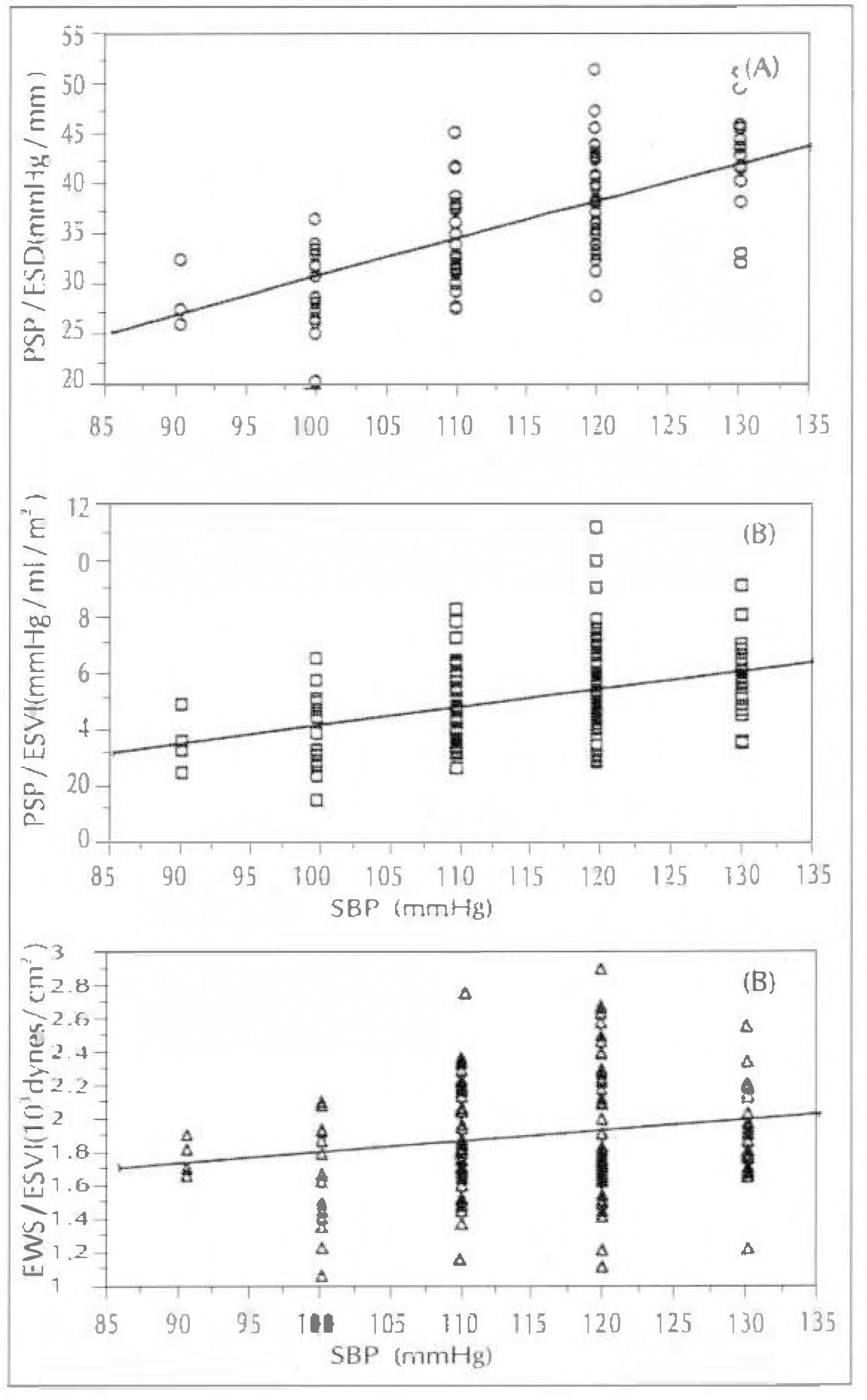
Fig. 2.
Relations of SBP to (A) PSP/ESD (r=0.32) (B) PSP/ESVI (r=0.06), (C) EWS/ESVI (r=0.002) in hypertensive subjects. SBP: Systolic blood pressure PSP: Peak systolic blood pressure ESD: Left ventricular end-systolic dimension ESVI: Left ventricular end systolic volume index EWS: Left ventricle end systolic wall stress.
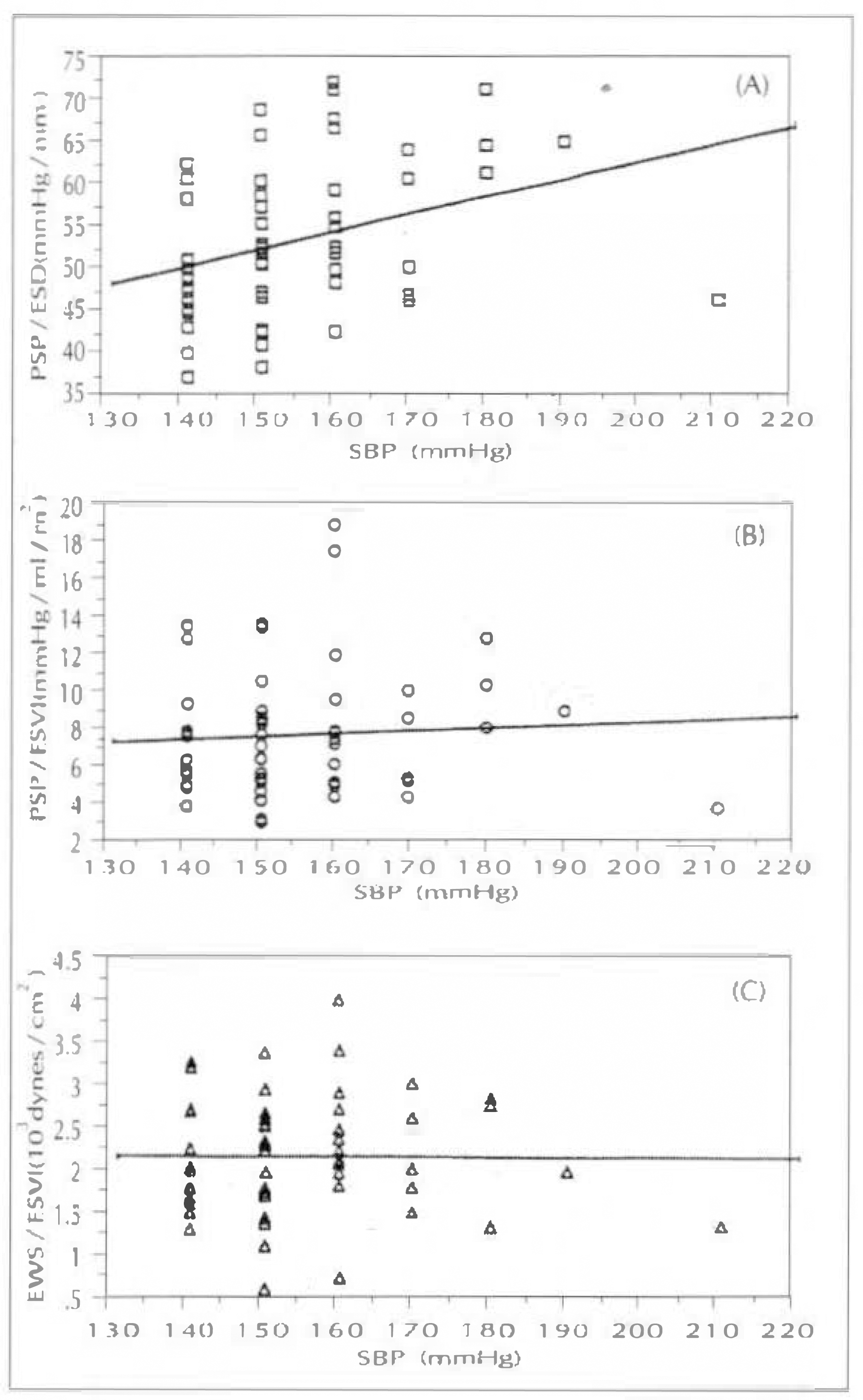
Fig. 3.
Relations of EDD to (A) PSP/ESD (r=–0.55) (B) PSP/ESVI (r=0.56), (C) EWS/ESVI (r=–0.40) in normal subjects. EDD: Left ventricular end-diastolic dimension, PSP: Peak systolic blood pressure ESD: Left ventricular end-systolic dimension ESVI: Left ventricular end systolic volume index EWS: Left ventricle end systolic wall stress.
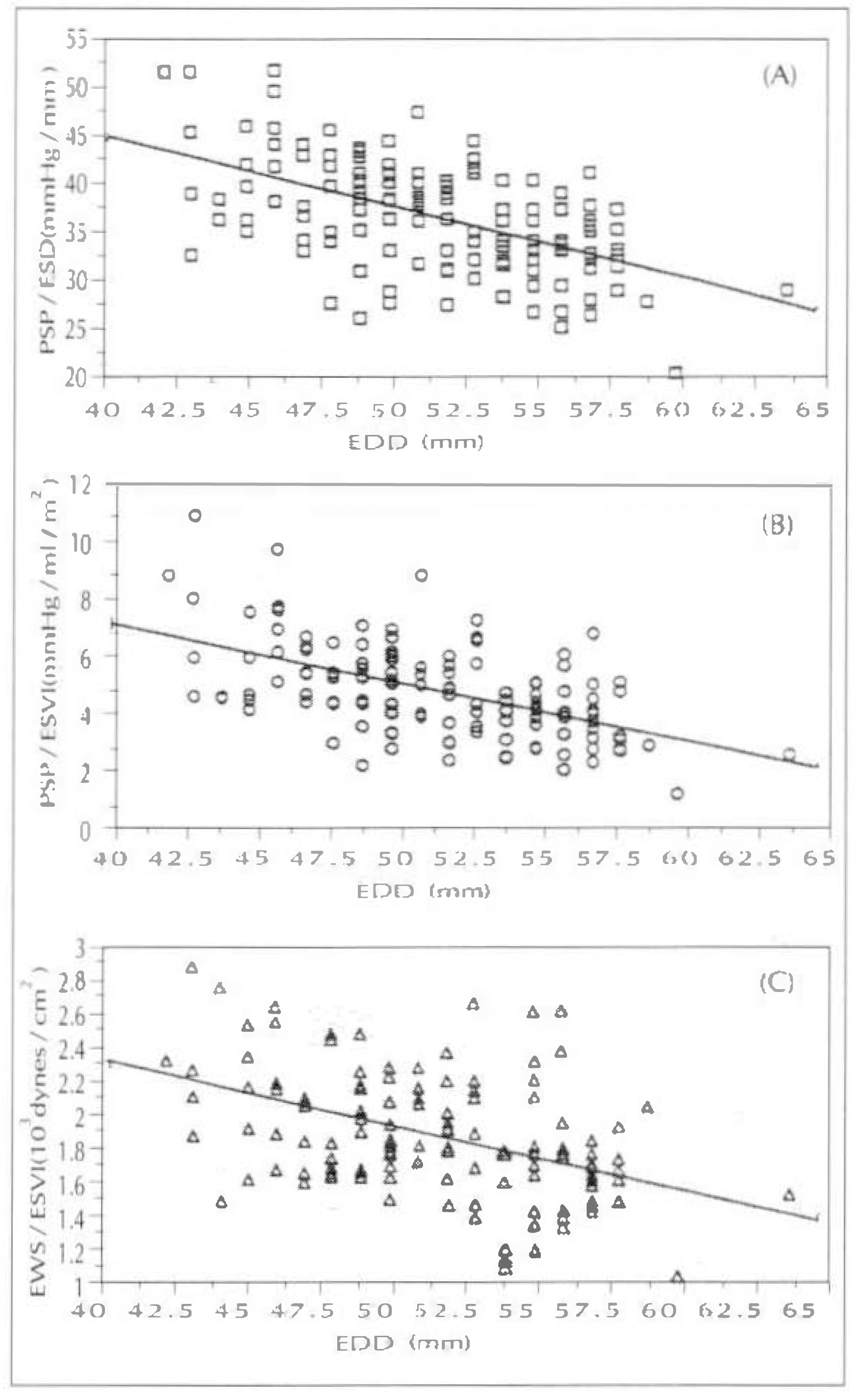
Fig. 4.
Relations of EDD to (A) PSP/ESD (r= −0.657) (B) PSP/ESVI (r=–0.68), (C) EWS/ESVI (r=–0.30) in hypertensive subjects. EDD: Left ventricular end-diastolic dimension, PSP: Peak systolic blood pressure ESD: Left ventricular end-systolic dimension ESVI: Left ventricular end systolic volume index EWS: Left ventricle end systolic wall stress.
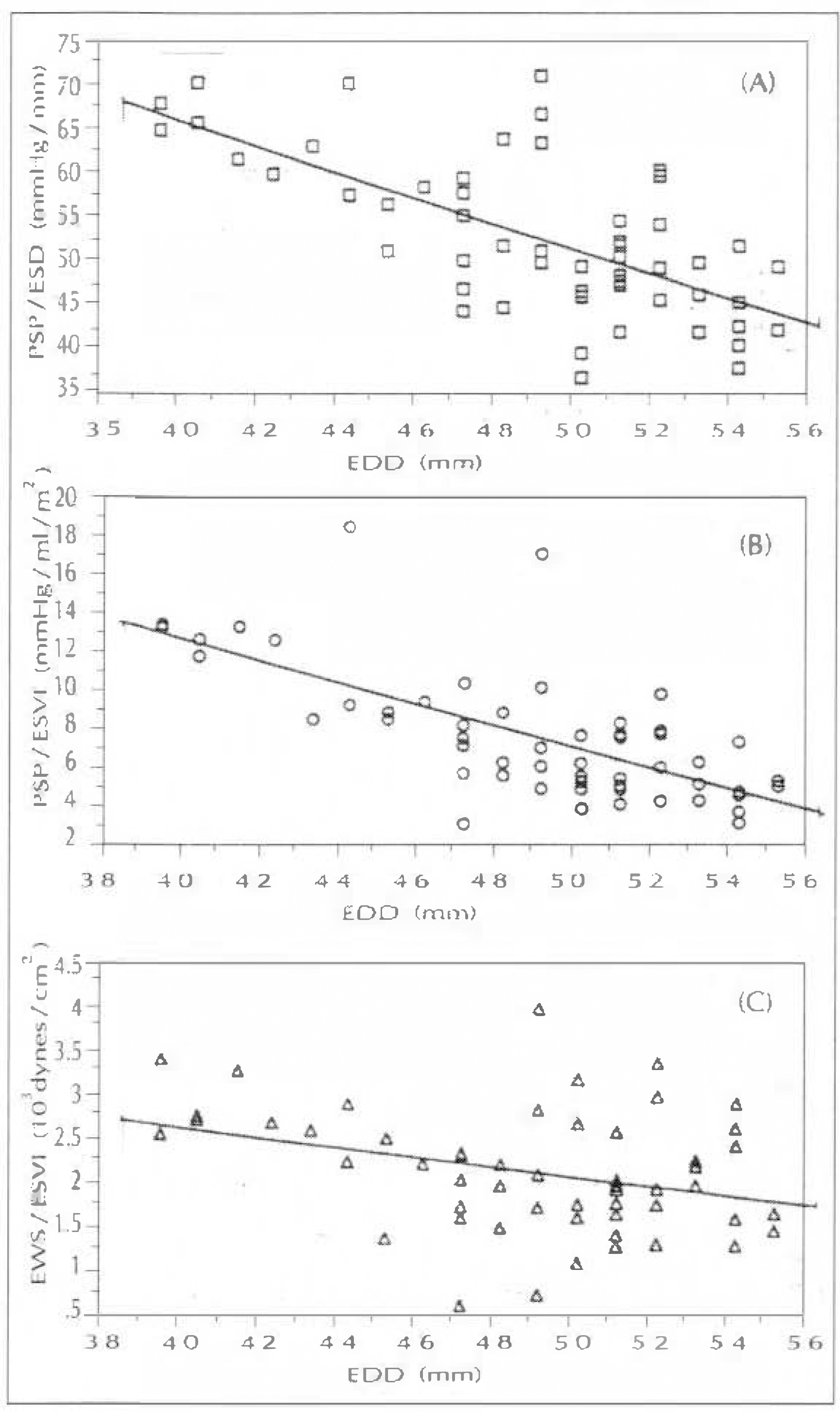
Table 2.
Characteristics of Normal and Hypertensive subjects
BMI: Body mass index LVMI: Left ventricular mass index Ht: Height ESD: Left ventricular end-systolic dimension EDD: Left ventricular end-diastolic dimension IVSd: End-diastolic interventricular septal thickness IVSs: End-systolic interventricular septal thickness LVPWd: End-diastolic left ventricular posterior wall thickness LVPWs: End-systolic left ventricular posterior wall thickness EWS: Left ventricle end systolic wall stress PWS: Left ventricle peak systolic wall stress ESVI: Left ventricle end systolic volume index
Table 3.
Left ventricular contractile function indexes in normal and hypertensive subjects
Table 4.
Correlation between blood pressure with contractile function indexes in normal and hypertensive subjects




 PDF
PDF ePub
ePub Citation
Citation Print
Print


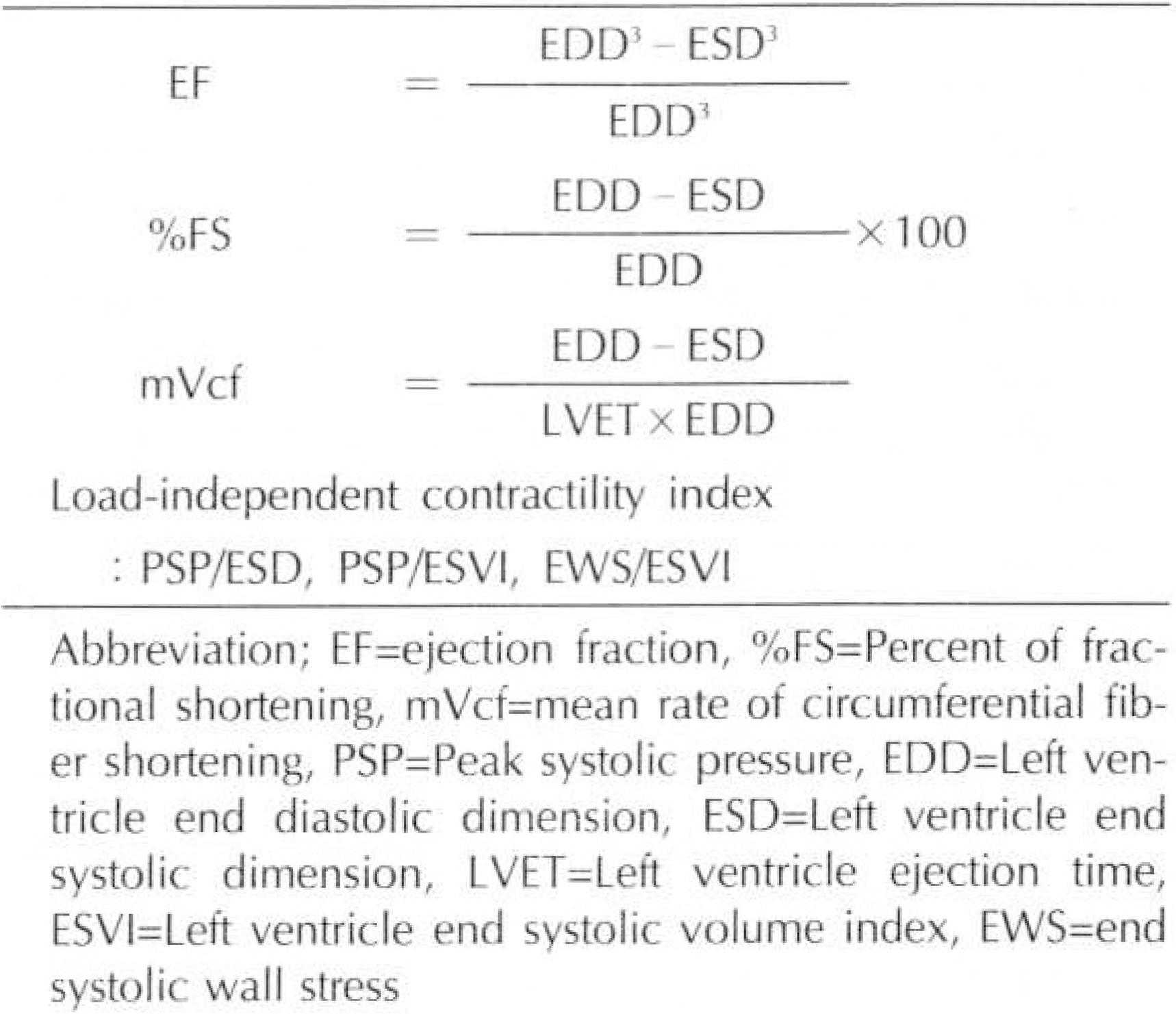
 XML Download
XML Download